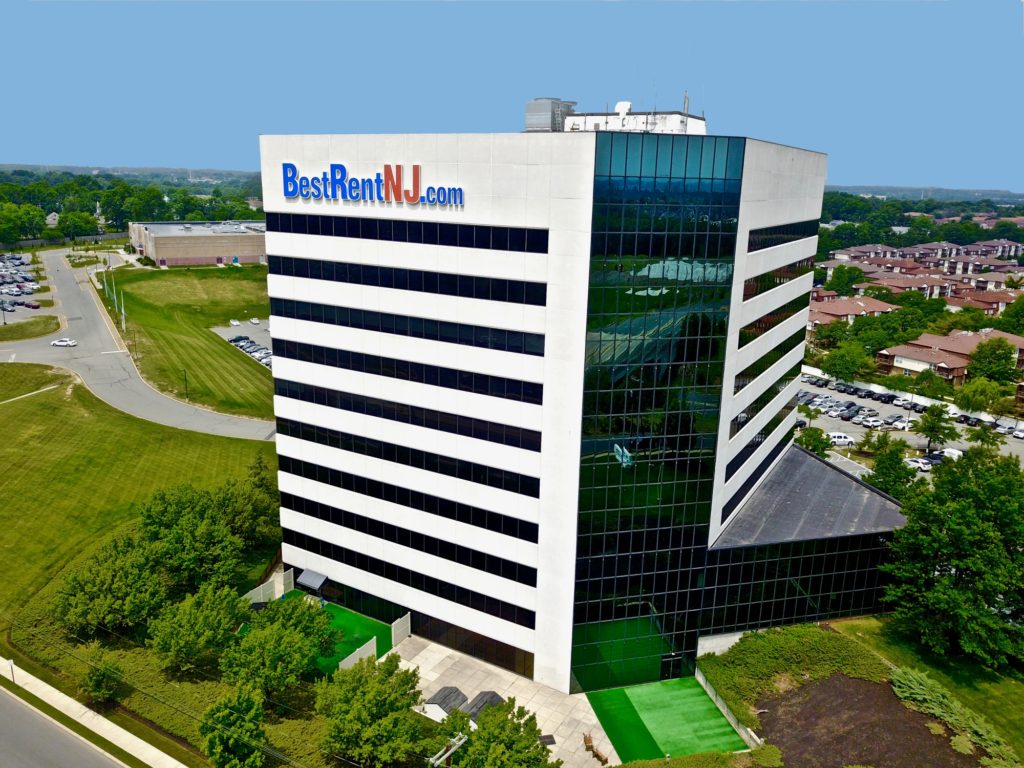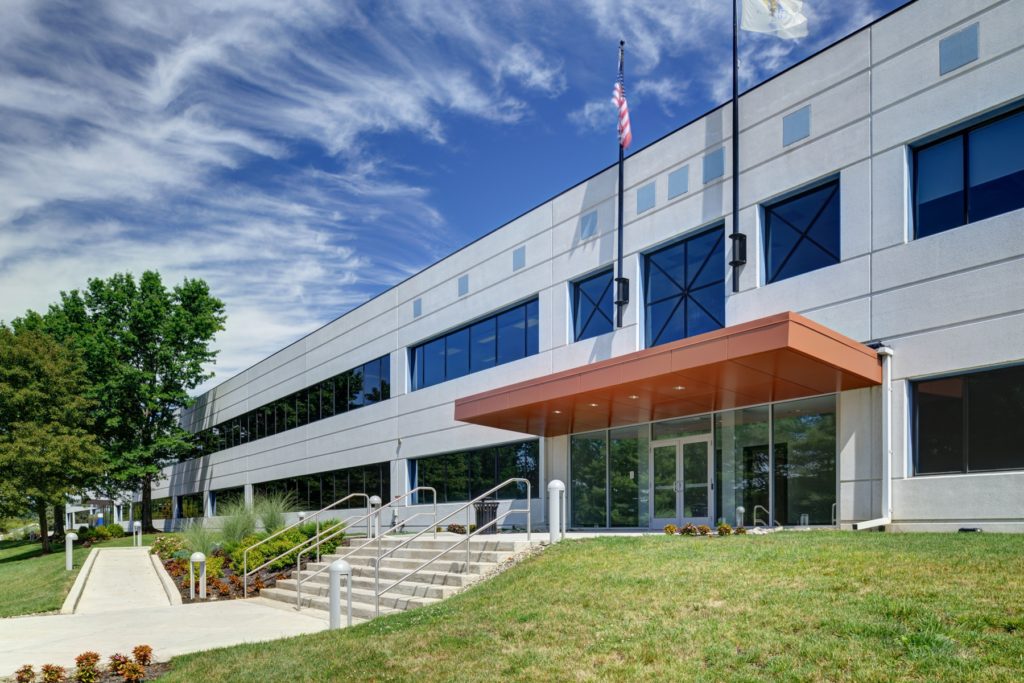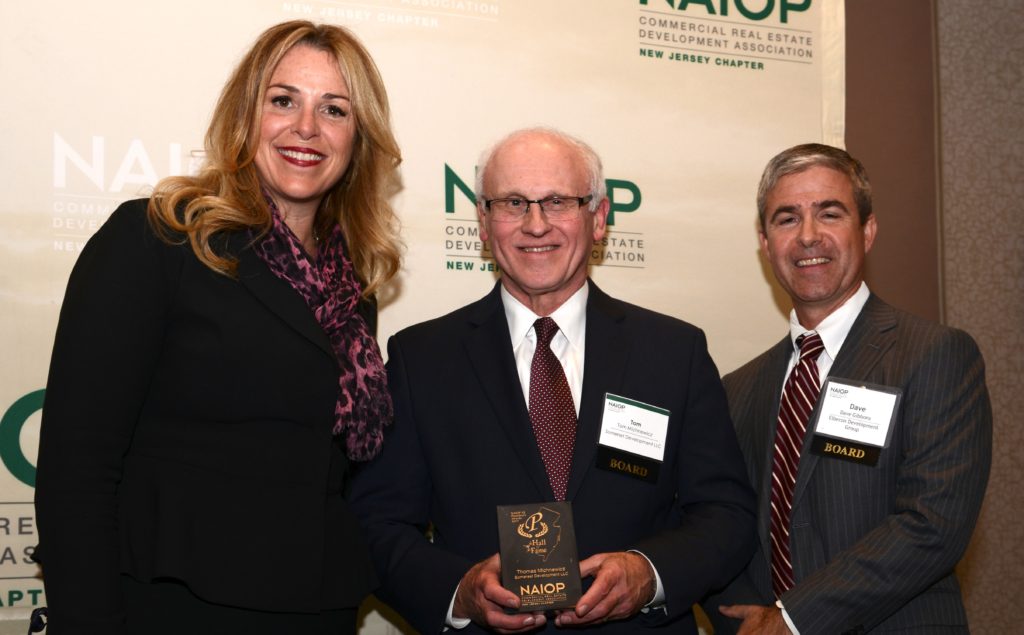Kim Brennan, chief operating officer for the New York tristate region, and David Simon, executive managing director and New Jersey market leader, have helped guide Colliers International’s growth in the state since 2015. — Photo by Mary Iuvone for Real Estate NJ
By Joshua Burd
Colliers International has left no doubt about its intentions to grow, from going public in 2015 to building its ranks through a flurry of new hires and acquisitions.
Kim Brennan and David Simon have seen that strategy pay dividends in New Jersey.
“All of those were good signs for us, pointing us in the right direction to achieve more market share,” said Brennan, who joined Colliers in 2015 as chief operating officer for the New York tristate region. “We’ve done some great deals and we’ve definitely made a hit with some of our recruiting. … And for me, it was just such a good move because the company can only go up.”
It has been a busy three years for both Brennan and Simon, who have worked together to lead Colliers’ expansion in northern and central New Jersey. The global real estate services firm has grown to about 36 leasing and sales brokers in the market — roughly double the size of its team in 2015 — with an expanded focus on industrial, retail and investments sales.
Colliers is also marking one year since it opened an office in Woodbridge, its third in New Jersey, to help support its long-term ambitions. Simon, the firm’s head of New Jersey operations, said his goal is to grow to about 50 brokers in the next several years, although he said the priority will be to add quality rather than quantity.
He and Brennan are also focused on maintaining a team that is able to remain nimble and locally grounded, but large enough to compete with the likes of JLL, CBRE and Cushman & Wakefield. Colliers’ footprint in New Jersey is one of some 500 offices globally, with around 16,000 total employees, following its spinoff from FirstService Corp. in 2015.
“We have all the resources, we have the scale, we have all the capabilities best-in-class … but we’re small enough that the brokers can really communicate well with our clients and our customers,” said Simon, an executive managing director. “And I think that’s really important.”
Both leaders said they were attracted to Colliers because it was a global platform with an entrepreneurial style. Brennan — who also oversees New York City, Long Island and Connecticut — joined the firm in February 2015 after 10 years as Cushman’s market director in New Jersey.
Simon was hired about four months later, with past positions including executive managing director for Massey Knakal Realty Services and managing principal for Cassidy Turley’s New Jersey office. For the 30-year veteran, Colliers offered the chance to be in another role that allowed for creativity in deal making, training and other aspects of the business.

That approach will be central to Colliers’ efforts to grow new service lines while building on its historical strength in office leasing. The firm did both last year, working on high-profile deals such as Billtrust’s 90,000-square-foot lease in Lawrenceville and Best Buy’s 725,000-square-foot industrial lease in Piscataway.
To discuss it all, Real Estate NJ sat down with Brennan and Simon at Colliers’ Parsippany office. Below are excerpts from the interview.
RENJ: It’s been nearly a year since you opened the Woodbridge office. Tell us about picking that location and the idea of committing to a third office in the state.
David Simon: There was a lot of thought behind doing that, given that we’re only 36 professionals right now on the brokerage side. But the primary focus, I would say, was based on our desire to really grow our industrial practice. That was one of the main reasons why we decided to be there.
As for the location, we chose 10 Woodbridge Center Drive because it has very easy access to the major road networks, it’s a building that has amenities and it’s a high-quality building. So from a recruitment standpoint, we knew that it would work well for us because there’s a lot of competitors in that market and clearly recruiting is tied into a big part of what we do every day. So we wanted it to be the right environment, not just for industrial brokers but for office brokers or retail specialists as well.
From that location, within an hour’s drive, you can reach 18W in the north to 7A in the south along the New Jersey Turnpike. So that was critical for us. We did studies to look at the buildings and the inventory that we can reach on the industrial side. And we wanted a presence in the Middlesex County area and the surrounding market, not just for industrial, but obviously to grow our business and support the clients and customers that we represent.
RENJ: So that sounds like it’s a good complement and serves a different purpose from your Princeton office, which you’ve had for several years now.
Kim Brennan: Princeton is its own unique market — they do a great job and they have a huge agency presence down there. They are definitely a dot on the map and other firms have considered it back and forth over the years, but there’s not a lot of other ones down there. And I think you really need to be down there in order to service that market, so we are and we want to leave that alone because they’re such a great office.
RENJ: Is retail a big point of emphasis in your expansion plans?
DS: We didn’t have anybody really focusing on retail before Kim and I joined. When you look at the retail market, there’s roughly 38,000 retail properties within central and northern New Jersey and that represents almost 390 million square feet of space. So it’s a big market.
It’s also a very visible market. When you have retail agencies, it’s visible to consumers and the public, so from a branding standpoint, it’s something that was important to us. And then, in addition, we have a lot of corporate clients. Colliers has a great national retail practice group and we needed to be able to service those clients on a local basis. So we’ve made an effort. And we’re still going to continue to grow and enhance, but we’re really happy with the team that we’ve started with.

RENJ: We know Colliers has been best known in the past as an office brokerage and that it’s a continued focus for you. How are you adjusting to what you’ve seen in that market?
DS: What we’re seeing overall is that there’s opportunities for tenants to continue to relocate … from the B buildings to the A buildings. And most of the older-generation buildings have already been renovated. So the lobbies have been done and the bathrooms have been done, and landlords have brought in food service and new cafés. That’s been the driving reason for tenants to move from one location to another — to get better quality space at the same or cheaper rent.
But the shift we really see is that, whereas years ago, the decisions for getting hired to represent a tenant was purely based on a relationship. Now it’s moved to more of a procurement-driven process, where companies really want to try to leverage internally and optimize their resources to create the most economic ability for themselves.
So what’s happening is that HR is becoming more involved, IT is becoming more involved. That goes back to the concept of making the work environment as attractive for your employees as you possibly can. And that’s what’s changing and that what’s driving why companies are moving from one building to another. It’s really just to create the best environment to attract the best quality people.
KB: It’s more of a process now and you have to check every box. And workplace strategy is huge — it’s in every large RFP we deal with.
RENJ: So do you also see the need to be a one-stop shop?
KB: We have to be in order to compete — because we’re advisers. We’re not street brokers. Those years are long gone. We have to have the whole package and our target is corporate America, so we have to be there. And I think we compete very well.
DS: The execution piece is critical, clearly, but it’s that tail end after all the strategy and all of the understanding of what the client ultimately wants to achieve. Their objectives have to be set way in advance of going out to market to figure out what they need to do, either on the tenant side or on the ownership side.
KB: And I think with most of the new pitches, at least that I’ve been in, it’s all about the process. It’s all about how you’re going to get there — not so much on the execution side, because everybody can execute, but they want to spend more time on the process and you have to have all those services in order to really compete for it.
RENJ: You’re both very involved with industry trade associations — David, most recently, as the chapter president of SIOR. How have you both leveraged that since you’ve been with Colliers and have looked to grow the firm?
DS: (SIOR) is a great organization … and it’s been great for me on many levels. There are 75 active SIOR members in New Jersey and when I call them, even though they might work for a different firm, we talk very openly, very transparently. If I have a market question or they have a market question, we deal on a very high level, knowing that there’s trust between us.
I think in my role and certainly Kim, in her role, you need to be out there, you need to be visible. And it’s good from a recruiting standpoint, but it’s really good just for the overall brand and for promoting Colliers. To me, there’s also a level of how much you need to be out there. … I think there’s a balance, so picking and choosing things that you’re passionate about and that will (allow you) to give back to the industry and the community — both in charity and trade associations. I think it’s critical that you do that if you’re in a leadership role.

RENJ: Kim, how about you with NAIOP New Jersey? You’re a past officer and have been a trustee there for several years.
KB: That is definitely one of the dominant trade associations in New Jersey. You have to be involved in NAIOP as a firm and we really weren’t when I got here, so I made sure that was the first thing I did. And we’ve recruited many other people from the firm to join NAIOP.
The (Rutgers Center for Real Estate) advisory board is also very important to me. We need to feed New Jersey with some college graduates, and the fact that they’ve established a program is huge for New Jersey and for keeping the jobs here. … So they’ve done a fantastic job over the past couple of years.
Ground up development
Among the nearly 20 brokers that Colliers International has added in New Jersey since 2015, roughly half of them have come with around 10 or more years in industry.
The other half are new by comparison, which Simon believes makes for the right formula.
“I think that’s a good mix because clearly we want to grow with people that are seasoned — they come in, they have relationships, they have business, but you also need to hire people that will help for the long run and can grow with the organization,” Simon said. “And I think that’s really important.”
Training and “building from the bottom” will be key for Colliers as it looks to grow its ranks in New Jersey, Brennan said. It’s been a proven strategy for her in the past, prompting her to bring what’s known as Colliers’ Accelerate program to the firm’s New York office.
The two-year program, which trains recent college graduates, has helped deepen Colliers’ roster in the city. Brennan now plans to bring the program to the Garden State.
“I’m very big on training because most of the other firms don’t do it, but we have to do it,” she said. “That’s what millennials want. They want to be trained, they want to see the next level and they want to learn.”
The program will be especially helpful in growing Colliers’ industrial practice in New Jersey, Brennan said. Industrial brokers are less apt to change firms than their counterparts in other asset classes, she added, so cultivating young talent is all the more important.
Brennan also noted that college graduates are often more enamored by the office market. But Colliers is committed to doing whatever it takes to build out its industrial platform, having “recognized that that’s where we need to grow.”
“I’m fine with building from the bottom up,” she said. “If it takes us 10 years, that’s OK, because I think that when your brokers want to stay and they’re loyal to the firm is when you’ve lifted them up from the bottom and you’ve helped them build.”









